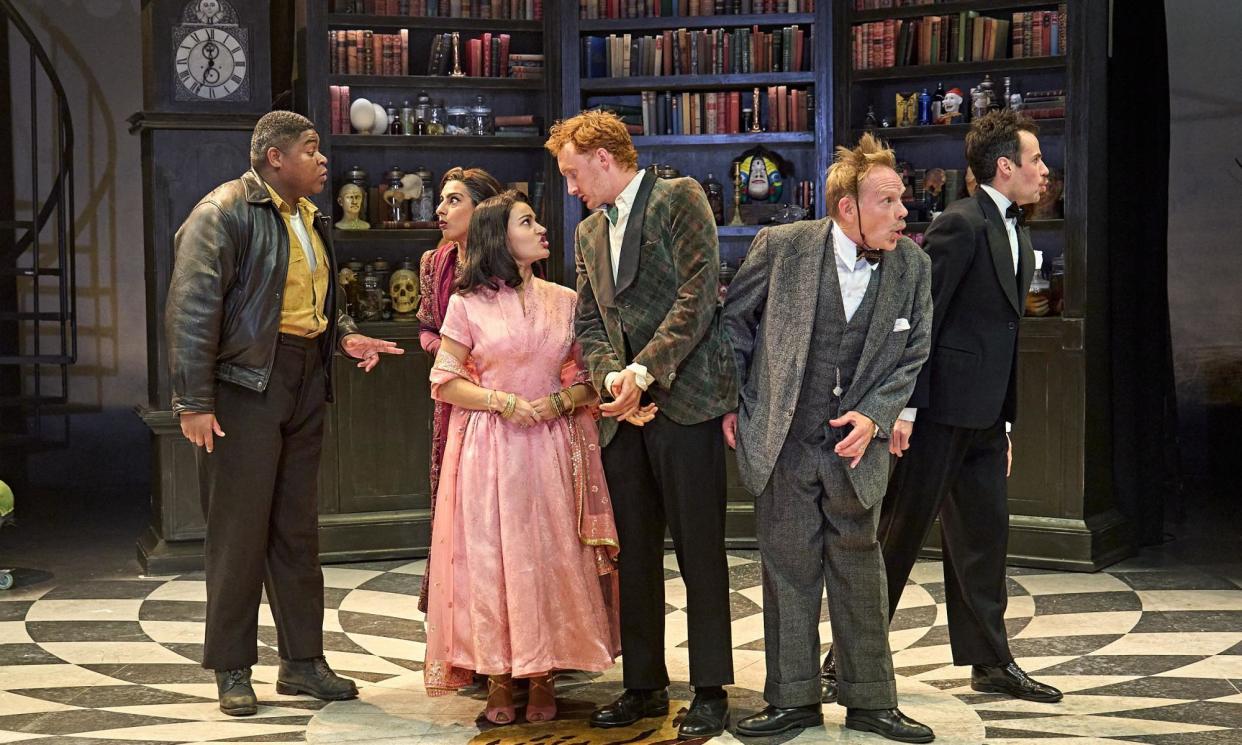The Cat and the Canary review – 1920s mystery stuffed with preposterous pleasures

If walls could talk you’d want to hear the rock’n’roll history at Redlands, Keith Richards’ country pile, whose infamy inspired Chichester Festival theatre’s new production. Meanwhile, in the Minerva next door, playwright Carl Grose has blown some of the cobwebs off John Willard’s creaky 1922 housebound mystery The Cat and the Canary, set in an eerie mansion which keeps tight-lipped about its secrets. These guests fear the walls are listening to their every move.
The captivating opening sequence is as much mission statement as scene-setter: a compendium of horror trappings including a creepy nursery rhyme, a torch searching the darkness and a puppet that evokes both Little Red Riding Hood and Don’t Look Now. Thunderstorms, cackles and ominous piano notes echo on Angela Davies’ elegant set whose black and white chequerboard flooring has an optical illusion that evokes a vortex, ready to swallow these unfortunates.
Paul Hunter directs Chichester’s co-production with Told By an Idiot, keeping his tongue firmly in cheek. The result is more spoofy than spooky, even at the close of the first and second acts, for which Willard saved his biggest frights. Grose relocates the tale from a manor on New York’s Hudson river to Cornwall’s Bodmin Moor. He keeps the period trappings and revamps the characters who are gathered to hear the will of Cyrus West (played splendidly by Reece Shearsmith in a projected video sequence). The plot retains the codicil to West’s will that if his named beneficiary is found to be of “unsound mind” that individual will forfeit the inherited fortune.
For Willard, this is chiefly a device to move along the hokum as the grasping guests scheme against each other and are gradually bumped off while an enigmatic escapee who think he’s a cat prowls away in the background. The source material will only bend so far for Grose’s more considered take on trauma and mental illness, and the production never manages to balance its mix of psychological horror and larky comedy. That’s despite an arrestingly physical performance by Lucy McCormick whose own terrifyingly funny cabaret shows capture the required off-kilter tone.
Willard’s overstuffed plot is matched by an over-egged visual style that, in Told By An Idiot’s trademark style, accentuates theatrical artifice. The night has no shortage of preposterous pleasures: an anthropomorphised clock and telephone, Adrienne Quartly’s sound effects which amp up the uncanny and a blackout in the house conversely acted out under bright lights. There are some sterling lines, too. Aren’t you scared of big empty houses, McCormick asks Will Merrick, who plays a hammy, Hamlet-quoting actor. “Not me, I’ve played Theatre Royal Windsor!” he replies.
The relationships remain flimsy but some wittily sketched characters include Hayley Carmichael’s inscrutable maid, Tarinn Callender’s boxer (“the Bethnal Green bruiser”) and Nick Haverson in umpteen roles, sometimes sharing a conversation with himself and adding his own drum roll during a death scene. The evening never exceeds the sum of its parts but plays out, like the opening minutes, as a series of inventively stylish sequences. It’s the methods you’re left with, not the madness.
At the Minerva theatre, Chichester, until 26 October


